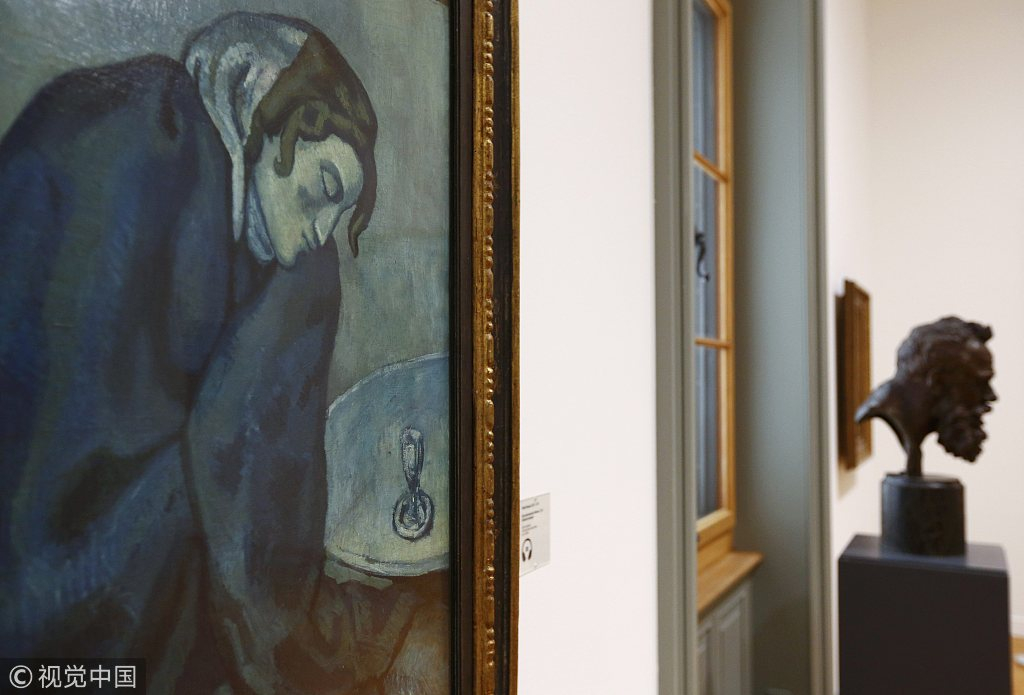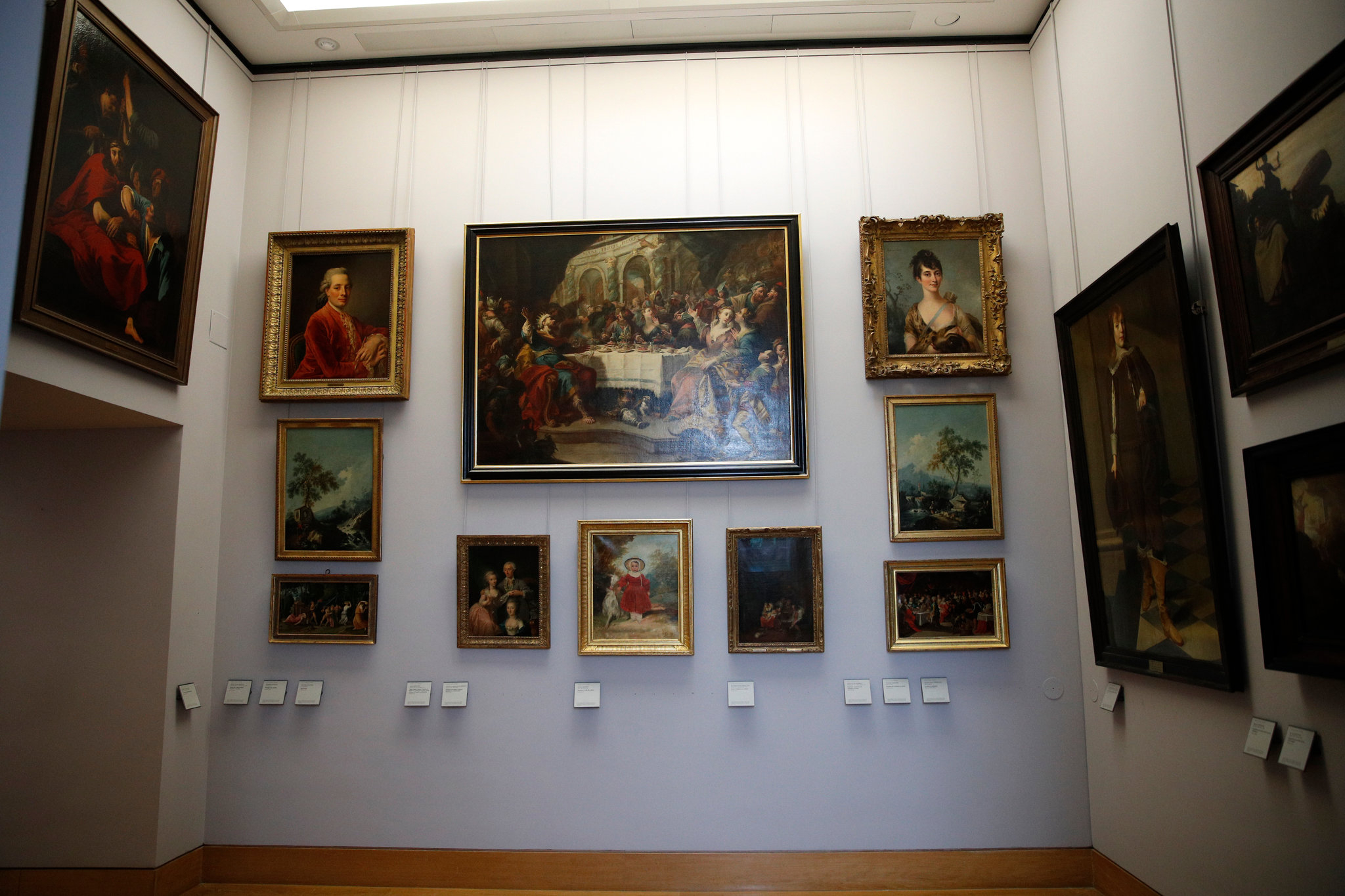A new exhibition has uncovered a hoard of art looted from a Jewish family almost wiped out by the Nazis in the Louvre and other leading French museums.
The show about the booming art market in occupied Paris, when more than two million objects went under the hammer in a frenzy of forced sales and looting, has turned up works by Delacroix and Forain taken from the family by the collaborationist French Vichy authorities.
Curator Emmanuelle Polack discovered that the Louvre bought a dozen works seized from the Dorvilles while researching a new book on how Jewish families and some of the most important dealers in modern art were plundered.
The paintings are still in the French national collection, with three loaned to the Shoah Memorial museum in Paris for the show.
Three more works taken from the family -- most of whom perished in Auschwitz -- have turned up in the Gurlitt hoard of 1,500 Old Masters, Impressionist and Cubist works found in a Munich apartment in 2011.

Spanish painter Pablo Picasso's 'Die schlummernde Trinkerin' (the dozed drinker) is seen in the Bern Art Museum in the Swiss capital of Bern November 24, 2014. The Bern Art Museum has agreed to accept artworks from a billion-euro collection from the late Cornelius Gurlitt, a recluse whose trove included masterpieces looted from their Jewish owners by the Nazis. /VCG Photo
Spanish painter Pablo Picasso's 'Die schlummernde Trinkerin' (the dozed drinker) is seen in the Bern Art Museum in the Swiss capital of Bern November 24, 2014. The Bern Art Museum has agreed to accept artworks from a billion-euro collection from the late Cornelius Gurlitt, a recluse whose trove included masterpieces looted from their Jewish owners by the Nazis. /VCG Photo
Despite decades of pressure to restore works to their rightful owners, Polack told AFP that there had yet to be a proper audit of the works acquired by the French national collection during the war.
"We need to look at their provenance very calmy and scientifically to lift all suspicion over them. It is hugely important that this is done," she said.
France's Prime Minister Edouard Philippe -- who visited the museum Monday -- boosted the investigative powers of a commission which awards compensation to victims of Nazi looting last year after criticism of the slow pace of restitution more than 70 years since the end of World War II.
'Amnesia'
In January, Polack helped return a painting plundered from the home of France's heroic pre-war interior minister Georges Mandel, a man Winston Churchill hailed as "the first resister".
Mandel, who refused to flee to London with Charles De Gaulle after France fell in 1940, was murdered by members of the French collaborationist "Milice" militia a month before Paris was liberated by the allies in 1944.
The portrait of a young woman by Thomas Couture was returned by the German government from the Gurlitt trove.
Polack told AFP that the free-for-all auctions during the war "utterly changed" the Paris art market, then the biggest in the world, and has been cloaked for decades behind "a kind of amnesia".
"Major players whose suspect practices helped them flourish during these dark years were rarely investigated," she said.
Some art world dynasties rose during the war while others never recovered.
The exhibition shows how the pillage was pre-planned, with galleries sealed off by German troops after the French capital fell in 1940, and the premises of its most famous modern art dealer, Paul Rosenberg, seized and turned into the Institute for Jewish Affairs, which pumped out anti-Semitic propaganda.

Claude Monet's 1904 "Water Lilies" painting hangs in the "Monet in the 20th Century" show at Boston's Museum of Fine Arts, November 30, as a controversy erupted about the painting's ownership history and inclusion in the show. The museum announced at a news conference that the painting is now believed to have been stolen from French Jewish art collector Paul Rosenberg by Nazi looters during World War II. It is currently held in trust by the National Museum of France. /VCG Photo
Claude Monet's 1904 "Water Lilies" painting hangs in the "Monet in the 20th Century" show at Boston's Museum of Fine Arts, November 30, as a controversy erupted about the painting's ownership history and inclusion in the show. The museum announced at a news conference that the painting is now believed to have been stolen from French Jewish art collector Paul Rosenberg by Nazi looters during World War II. It is currently held in trust by the National Museum of France. /VCG Photo
More than a third of Rosenberg's 162 seized paintings are still missing, including works by Picasso, Degas and Matisse.
Greed and treachery
Another legendary gallerist Rene Gimpel, who joined the resistance, was denounced by a rival dealer Jean-Francois Lefranc and died in a German concentration camp.
Others were forced to "aryanise" their businesses, like Pierre Loeb, who had to hand over his gallery to his colleague Georges Aubry.
But as the exhibition shows, when the war was over Aubry refused to give it back until Picasso -- a communist who had remained in France throughout the war -- forced him.
Polack said she was now working to help the family of collector Armand Dorville, who had given works to French museums before the war and had intended to leave more in his will.
"It is not just about getting paintings back, it is about grief and acknowledging the terrible injustices of the past," she said.
"Confiscating art works was part of a process which started with people being demonised, excluded from professional life, then pauperised when their bank accounts were seized before finally being deported for extermination in the camps," Polack insisted.
The paintings they were deprived of could have helped buy their escape, so "they were caught in a trap", she said.

Paintings looted or bought by German occupiers during World War II were put on display together at the Louvre in Paris in 2018. /AP Photo
Paintings looted or bought by German occupiers during World War II were put on display together at the Louvre in Paris in 2018. /AP Photo
Prime Minister Philippe did not refer to the often drawn-out legal process of restitution during his speech at the museum, but promised to double state funding for the memorial from next year.
Polack said she was encouraged by the attitude of the Louvre.
"I think lending the three works to us (for the show) is a very big step and there is a good dynamic. They know the context and they know we need to work together to do everything properly to solve this problem," she added.
(Top image: French Prime Minister Edouard Philippe (right) reads names on the 'Wall of Names' during a visit to the Shoah Memorial Museum in Paris where a new exhibition showcases art looted by the Nazis. /AFP Photo)
Source(s): AFP





